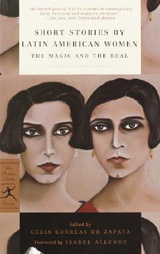

Modern Library, paperback, 0812967070
If I asked you to name women writers of Latin America, how many could you name? If you were me, it would not be many. And if you, like me, seek to remedy that yawning gap in your reading, I would recommend you start with this wonderful anthology.
Short Stories by Latin American Women is a Modern Library collection of thirty-one stories by writers who represent fourteen Latin American countries. Of the thirty one authors, roughly two thirds are still living. Authors featured include: Isabel Allende (Chile), Clarice Lispector (Brazil), Elena Poniatowska (Mexico), Rosario Ferré (Puerto Rico), and Luisa Valenzuela (Argentina). If you do not recognize these names, this book will be a fabulous introduction to these women and others for you. As Isabel Allende tells us in her short forward to the collection:
Judging from the short biographies of the writers (included in the back of the volume), the siege Allende speaks of began in the early decades of the 20th century. Allende's forward is followed by a slightly longer and more thorough introduction by editor Celia Correas De Zapata. Her introduction takes us further back to the anthology's roots—back to the time of the Conquest, to the "beauty and attainments" of Sor Juana Inés de la Cruz in seventeeth century Mexico, and to the literary work of nineteenth-century women, before bringing us to this contemporary collection of twentieth century work. She touches on the concept of magical realism which pervades many of the stories in the anthology.
As the stories in this collection are arranged alphabetically by author, Isabel Allende opens the collection with her story, "Act of Vengence," an entralling tale of Dulce Rosa Orellano, daughter of the most powerful man in the province. Allende's story reads like a cross between a folk tale and an American western. María Luisa Bombal's "The Tree" is a smoothly told tale in which the web of a young woman's past magically entraps her in the present. In Carmen Naranjo's "Symbiotic Encounter," a couple ungoes a magical (and fascinating!) transformation in the course of their evolving—or devolving—intense relationship. Amparo Dávila's intriguing story "The End of a Struggle" focuses on an insecure man who sees himself, on the other side of the street, with his arm around a beautiful woman just as the couple disappears around the street corner. He is plagued with the question of which one of them is real, and which is a shadow, and he decides he must confront this other self.
I thoroughly enjoyed this collection (with the exception of perhaps one or two selections). The stories are rich and
innovative, inviting and satisfying. Sometimes, after finishing a story, I would scrounge on the internet for more
information about the writer I was being introduced to. There I would discover that María Luisa Bombal fled to
Argentina after shooting her husband following a failed suicide attempt. That Clarice Lispector, a legendary brainy
Brazilian beauty, was first published when she was twenty three. Luisa Valenzuela (b. 1938) worked in the library
with Borges while she was still a teenager and began publishing when she was just seventeen. Any book that sends one
off to discover even more, is a gift to the reader.